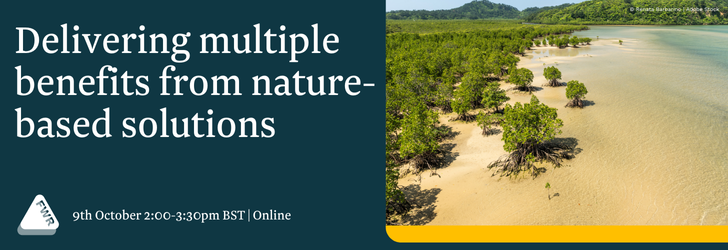This discussion meeting will bring together experts on nature-based solutions to discuss how they can support a healthy and resilient water environment, whilst delivering multiple benefits for people and nature.
Each speaker will provide a short presentation exploring their views on the role of nature-based solutions in delivering multiple benefits and how these can be delivered in practice. Speakers will touch on projects that have taken place both in the UK and internationally.
We will then move into a panel discussion, where attendees will have the opportunity to pose their questions and hear more about the key enablers for developing and embedding nature-based solutions.
This event has been organised by the FWR’s Water Environment and Ecosystem Services Technical Panel, leading on previous work they have done on enabling nature-based solutions.
The Foundation for Water Research (FWR) is an independent community of professionals from across the water sector and related scientific specialisms. The community comes together for deliberative discussion to support the development of interdisciplinary solutions to water challenges. Sign up to their free mailing list here.
Our speakers
Dr Gabriela Dotro
Gabriela (Gaby) is Chair of the Constructed Wetland Association and founder of NbS Future, delivering expert services that bridge conventional and nature-based water treatment expertise. With 20 years of experience translating innovation into practical implementation, she currently leads strategic consulting projects for UK water utilities and regulators while maintaining academic links as Visiting Fellow at Cranfield University. Gaby pioneered the UK's first French Wetland implementation and co-developed Scottish Water's innovative DCENT flowsheet, demonstrating her expertise in integrating NbS with conventional treatment systems. As lead author of industry guidance on treatment wetlands that informs discussions between the Environment Agency, Ofwat, Defra and water utilities ahead of investment decisions for 2025-2030, she specialises in providing evidence-based, objective analysis that ensures optimal technology selection for delivering multiple benefits across water management challenges.
Joff Edevane
Joff is a past freshwater biologist with 30 years of industry experience in wastewater treatment and environmental regulation, currently focusing on the reduction and treatment of storm overflows, nature based solutions and catchment approaches.
Dr Mark Everard
Mark has been working on ecosystem services and the concepts leading up to the formulation of that term since the late 1970s. His background is in aquatic sciences but this has morphed into the wider systemic implications of the societal benefits of nature, and the vulnerability of nature to society, in a range of roles in science, policy, practical implementation and broadcasting in UK/Europe, Africa, East Asia and Australia. As a systems scientist, Mark supports the concept of nature-based solutions, though is concerned that many applications lack a systemic framing. Mark’s work developing practical tools such as those adopted and implemented globally the Ramsar Convention and its signatories represent important steps towards mainstreaming these concepts, though against the current co worrying backdrop of retractions from commitments to sustainable development around the world.
Angus Middleton
Angus has been a director of environmental consultancies for 20 years, working on natural capital since 2013. He has frequently partnered with multi-disciplinary professionals, academics, policy makers and communities to deliver successful nature-based projects. He excels at blending commercial pragmatism with scientific rigour and stakeholder concerns. Angus was recently a member of the Innovation Advisory Board for NERC and helped create the Natural Capital Protocol. Angus has led Viridian to win many prestigious prizes for their innovative creation of new methods and tools to model, specify and quantify nature-based solutions.
Lila Stewart-Roberts
Lila is the Programme Coordinator of the Nature-based Solutions Initiative, University of Oxford, where she facilitates interdisciplinary research on how nature-based solutions (NbS) can support thriving human and ecological communities. She also manages the Global Map of best-practice NbS case studies from around the world and leads communications for the initiative. With training in food systems and ecological economics, Lila seeks to promote equitable nature-based solutions for social and environmental wellbeing through her work. She brings experience spanning third sector, research and student leadership and holds an MSc in Biodiversity, Conservation and Management from the University of Oxford, and a BSc in Biology from the University of Bristol.
Header image: © Renata Barbarino | Adobe Stock


